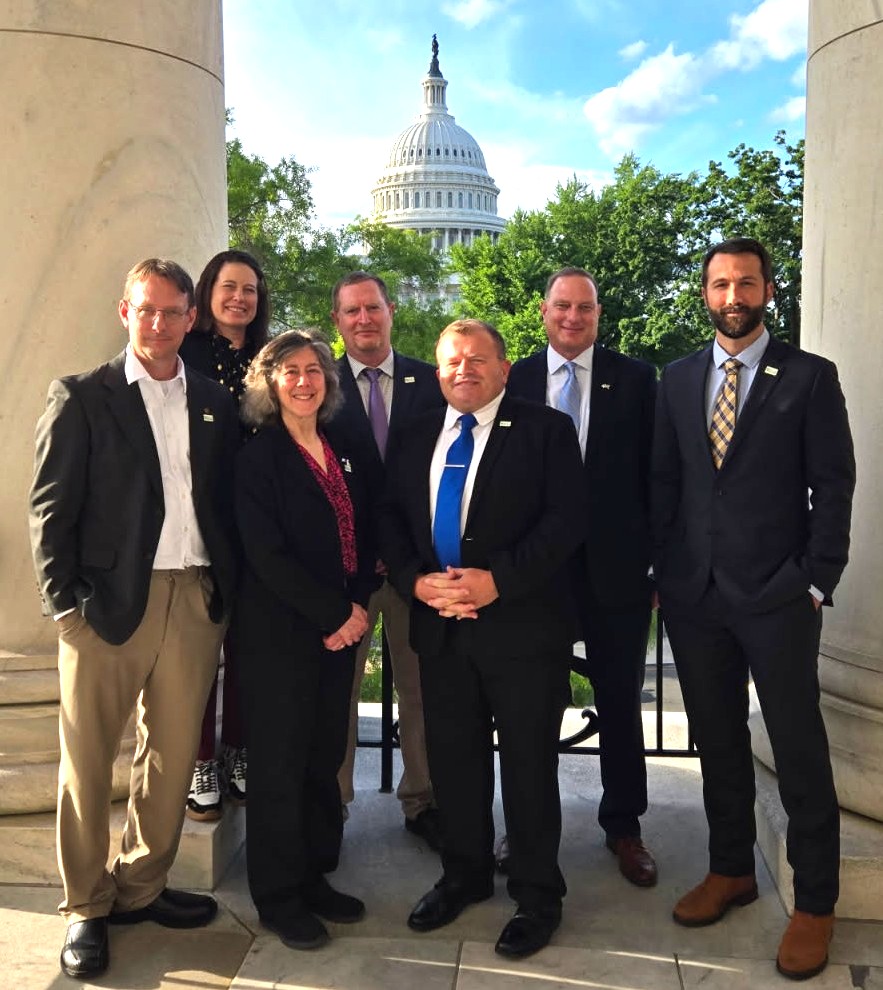Westminster, Colorado, USA
May 28, 2025
WSSA leaders recently met with key ag committee legislators and staffers in Washington to share their priorities for renewed research and education funding
 WSSA sent its representatives to Washington D.C. recently to discuss its priorities with key legislators and staffers. The WSSA representatives pictured here are (front, left to right) Ian Burke (WSSA President-Elect), Hilary Sandler (WSSA President), Lee Van Wychen (Executive Director of Science Policy); (back left to right): Dawn Refsell (WSSA Vice-President), Thierry Besancon (NEWSS President), Eric Palmer (SWSS President), Carl Coburn (WSWS President).
WSSA sent its representatives to Washington D.C. recently to discuss its priorities with key legislators and staffers. The WSSA representatives pictured here are (front, left to right) Ian Burke (WSSA President-Elect), Hilary Sandler (WSSA President), Lee Van Wychen (Executive Director of Science Policy); (back left to right): Dawn Refsell (WSSA Vice-President), Thierry Besancon (NEWSS President), Eric Palmer (SWSS President), Carl Coburn (WSWS President).
The Weed Science Society of America (WSSA) sent its leaders to meet with key ag committee legislators and staffers in Washington, D.C., this month, shortly after garnering results from a recent member survey; the goal was to better understand the impact from sudden, first-quarter 2025 federal funding cuts to agriculture.
WSSA surveyed its members during March and April for feedback about those cost cuts. “Our survey results reveal widespread concern and disruption in the weed science and agricultural research communities due to recent federal government actions,” says Hilary Sandler, Ph.D., and WSSA president. “Many respondents noted impacts related to funding instability, job losses, and the breakdown of collaborative research networks. Most respondents warned that the scale and abruptness of cuts are undermining U.S. agricultural research, education, and food security.”
With more than 2,000 members, WSSA is a non-profit professional organization that represents academic (extension, education, and research faculty and staff), government, industry, private consultants, and independent researchers, in addition to students and federal, state, county, and private land and aquatic plant managers. All are dedicated to fostering an awareness of weeds, their impact on vital ecosystems, and how best to manage them.
The WSSA’s survey results indicated a membership segment was unaffected and/or supported federal budget cuts, citing the need for fiscal responsibility and reduced government spending. The majority indicated an array of concerns, including:
- Widespread Disruption: Most respondents reported significant negative impacts from recent federal government actions, especially funding freezes, grant cancellations, and workforce reductions.
- Funding Uncertainty: Many also cited delayed, cancelled, or frozen federal grants (USDA, NIFA, NSF, EPA, among others), leading to halted research, inability to hire or retain staff and students, and project terminations.
- Job Losses: Layoffs, forced retirements, and non-renewal of contracts were reported as common, impacting both federal employees and those in academia or private research reliant on federal funds.
- Collaboration Breakdown: Many noted that a loss in federal partnerships (such as USDA, Forest Service, ARS) have disrupted collaborative research and extension activities.
- Morale and Trust: Numerous members described low morale, anxiety, and loss of trust in federal agencies, with some noting a loss of institutional knowledge and a declining interest in public service careers.
- Student and Early Career Impact: Many graduate students and postdocs reported funding insecurity, loss of positions, and uncertainty about future opportunities.
- Research on Hold: Numerous members reported that several programs related to weed science, invasive species, and agricultural innovation have been paused or downsized.
- Broader Concerns: Some respondents noted negative impacts on the farm economy, food security, and U.S. global leadership in agricultural research.
“Recent federal government actions and their impact on long-standing initiatives to support weed management research and education are of great concern,” says Sandler. “In response, WSSA has met with ag committee legislators and staffers in Washington D.C. to share our priorities for continued weed management research, extension and education funding for the rest of 2025 and beyond.”
WSSA’s current policy priorities can be found online at this policy weblink. These priorities include focus areas on extension and research; integrated weed management; crop productivity and sustainability; and workforce competency. More information about WSSA policy positions can be found on its science policy webpage.
About the Weed Science Society of America
The Weed Science Society of America (WSSA), a nonprofit scientific society, was founded in 1956 to encourage and promote the development of knowledge concerning weeds and their impact on the environment. The Society promotes research, education and extension outreach activities related to weeds, provides science-based information to the public and policy makers, fosters awareness of weeds and their impact on managed and natural ecosystems, and promotes cooperation among weed science organizations across the nation and around the world. For more information, visit www.wssa.net.